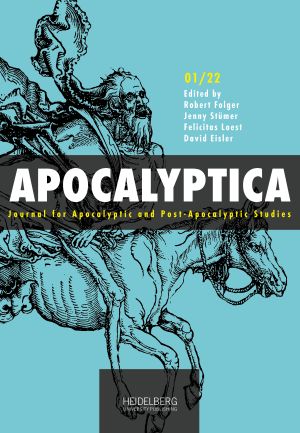In den Geisteswissenschaften gibt es erfreulich viele Zeitschriften, die gemäß des Open-Access-Prinzips kostenlos zugänglich sind.
Kennen Sie diese schon?
Apocalyptica
Apocalyptica is an interdisciplinary, international, double-blind peer-reviewed academic journal published by the Käte Hamburger Centre for Apocalyptic and Post-Apocalyptic Studies (CAPAS) at Heidelberg University. The journal publishes thought-provoking voices and diverse perspectives invested in the end of worlds.
As anthropogenic climate change, increasingly polarised politics, and the COVID-19 pandemic anticipate the end of worlds, the idea of the apocalypse is gaining traction in popular and scholarly discourses. The notion of a doomed world saturates discussions on politics, economics, and technology, it is also prevalent in film, art, media, and literature. Crucially, apocalypses and their imagined aftermaths produce emancipatory and creative potentials that engage the possibility of plural worlds, embodied futurities, and non-linear temporalities. These possibilities of the apocalypse are increasingly reflected in the invocation of haunting sensibilities, experimental imaginaries or lived experience that employ the un/making of worlds.
Apocalyptica explores the many sides of apocalyptic thinking in order to investigate an archive of the apocalyptic imaginary and to explore experiences of the apocalypse and post-apocalypse as they unsettle the past, present, and future.
We are seeking submissions from a broad range of fields in order to champion the potential of critical thinking and cultural analysis in the humanities, social‑, and cultural science as an imaginative and (potentially) transformative force. We also draw on the environmental and natural sciences, where appropriate. Our aim is to encourage the production of transdisciplinary knowledge and debate on the apocalypse as a figure of thought, a discourse tradition, a concrete experience, and a historical phenomenon.
Colloquium: New Philologies
The word colloquium is interpreted as “discussion, interview, meeting, parley, conversation”, and these terms already contain the essence of what this journal is about: We would like to provide a multilingual (virtual) space for academic voices from different backgrounds to encounter each other, exchange ideas and experiences, negotiate theories and critical approaches in a process of communication and transformation that extends beyond the immediate participants, and that reverberates in the groups and societies that form its context. As an Open Access journal, Colloquium: New Philologies is freely available to everyone, and this is also to be understood as a statement inviting and supporting a concept of open, participatory, and free science transcending the limits of disciplines, cultures, and languages.
WikiJournal of Humanities
https://en.wikiversity.org/wiki/WikiJournal_of_Humanities
The WikiJournal of Humanities is a journal devoted to the humanities, arts, psychology, and social sciences in their broadest sense. It is a sister to the WikiJournal of Medicine and WikiJournal of Science, and part of the larger WikiJournal publishing group. Its function is to put articles through academic peer review for dual-publication as a stable, citable version in the journal, and as living documents in Wikipedia and other Wikimedia projects.
The journal is hosted by the Wikimedia Foundation, the same organization that runs Wikipedia. Articles that pass peer-review are published as a citeable, indexed PDF, and suitable text and images are integrated into Wikipedia and related projects (with a link to the indexed PDF). The vast readership of Wikipedia results in a high effective impact of included works.
The journal publishes both review articles and original research in various formats. WikiJournals enable academics to contribute expert knowledge to the Wikimedia movement in the academic publishing format that directly rewards them with citable publications. Included works are assigned DOI codes (permanent links to each work via Crossref).
The journal targets a broad population spanning from advanced researchers and professionals to students and laypersons, wherein the latter can get quick explanations of advanced terms by in-line links to Wikipedia.



